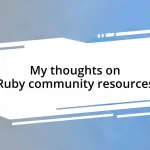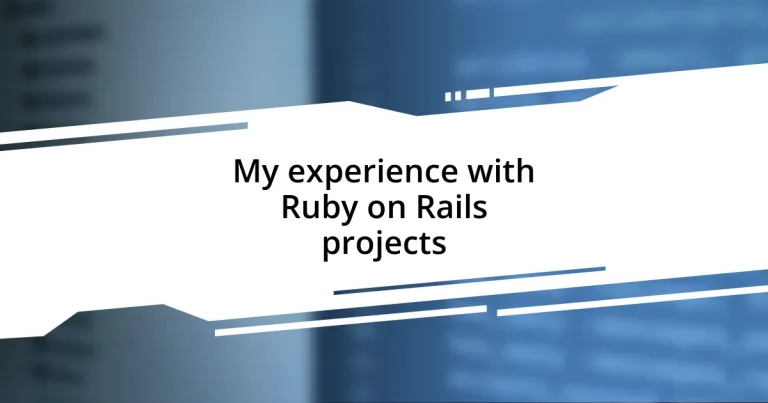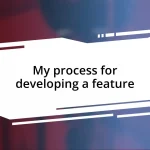Key takeaways:
- Engaging with the supportive Rails community can enhance learning and project development.
- Understanding and adhering to the “Rails way” is crucial for successful project execution.
- Incorporating best practices like version control and documentation mitigates stress and improves collaboration.
- Effective communication and flexibility in planning are vital for adapting to changes and reducing technical debt.

My Ruby on Rails journey
My Ruby on Rails journey began when I stumbled upon it while looking for a more efficient way to build web applications. I vividly remember the moment I set up my first Rails project. The excitement was palpable as I crafted my first CRUD (Create, Read, Update, Delete) operations. Who knew that such a simple concept could lead to the realization of my ideas?
As I delved deeper, I encountered the Rails community, full of passionate developers ready to help each other out. I once posted a question on a forum, and within hours, several experienced developers chimed in with their insights. It amazed me how collaborative and supportive the community was, making the experience feel less isolating. Has there ever been a moment in your journey where a simple question led to unexpected connections?
The first time I deployed an application to Heroku was a mixture of anxiety and exhilaration. Waiting for the deployment message felt like waiting for exam results! When it finally went live, I couldn’t contain my joy. I had transformed lines of code into something tangible that real users could interact with. That experience taught me the true power of Ruby on Rails—turning ideas into reality, one line at a time.
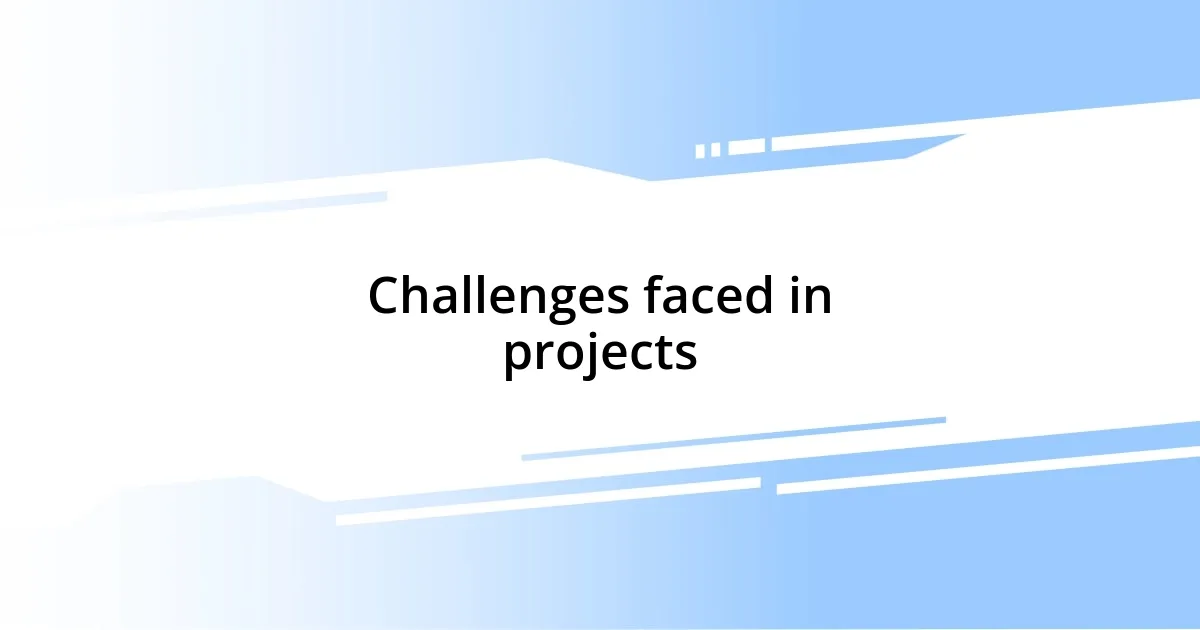
Challenges faced in projects
Encountering challenges in Ruby on Rails projects is part of the. One of the early hurdles I faced was dealing with dependencies and gem management. I remember one particular instance when a gem I relied on became deprecated overnight, causing my application to break just before a presentation. It was a crashing realization that staying updated is crucial, and I learned to always read the fine print when adding gems to my project.
Another significant challenge was mastering the conventions of Rails. Initially, I found myself struggling with the “Rails way” of doing things, which was drastically different from other frameworks I had previously used. The first time I tried to implement a feature without adhering to the Rails conventions, I ended up frustrated and lost in a labyrinth of code. It taught me that understanding the framework’s philosophy is vital for successful project completion.
On a technical level, performance optimization was another tough nut to crack. I vividly remember a project where I encountered slow response times. After a series of tests and tweaks, I discovered that eager loading associations could dramatically improve performance. This experience underlined how critical it is to not only write functional code but also to write efficient code that scales.
| Challenge | Personal Insight |
|---|---|
| Dependency Management | Learning to stay updated and manage gems responsibly was a hard lesson but essential for project success. |
| Learning Conventions | Adapting to the Rails way opened my eyes to the beauty and efficiency of the framework. |
| Performance Optimization | Understanding how to optimize for performance became a game changer in how I approached my projects. |
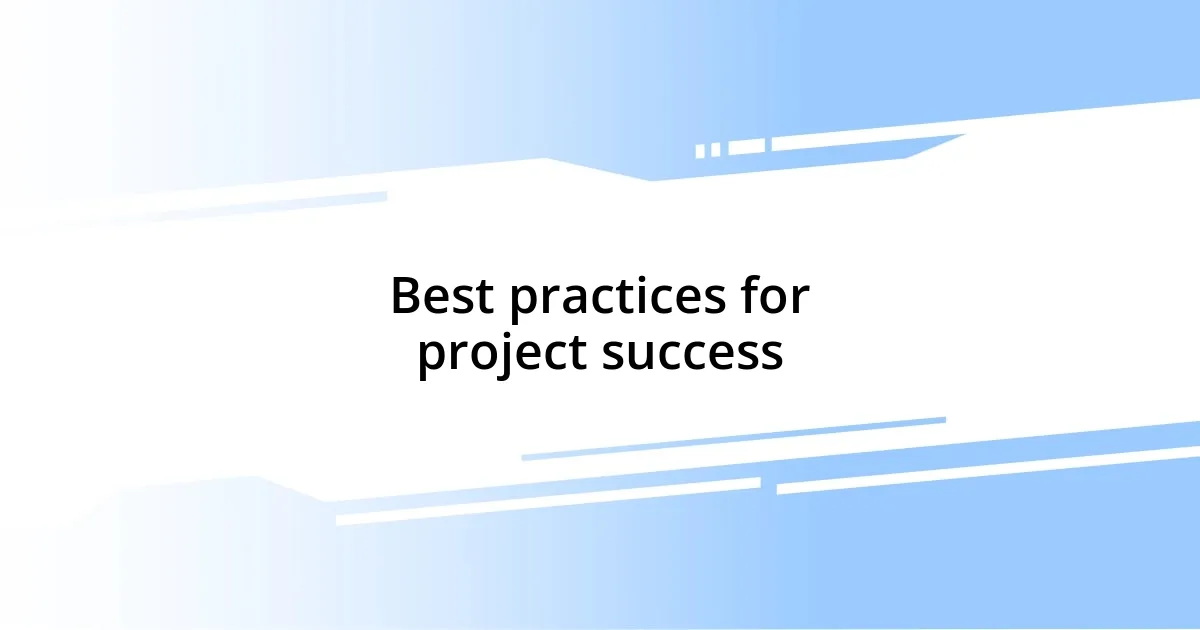
Best practices for project success
When it comes to achieving success in Ruby on Rails projects, embracing good practices early on can make all the difference. One of the best pieces of advice I received was to prioritize the MVC (Model-View-Controller) architecture. There was a project where I mismanaged the controller’s responsibilities, leading to a messy and confusing codebase. It felt overwhelming, but reorganizing my code according to MVC principles not only clarified my design but also streamlined future development. In my experience, sticking to the architecture doesn’t just keep things tidy; it also allows for easier collaboration and scaling later on.
Here are some best practices that I recommend:
- Version Control: Use Git to keep track of changes. It’s a lifesaver when trying to troubleshoot or revert to previous working states.
- Test Early, Test Often: Implementing RSpec or Minitest from the get-go can save you countless headaches. I learned this the hard way when a missed test led to a last-minute bug.
- Keep Dependencies Up-to-Date: Regularly check for updates on gems and maintain compatibility. Believe me, there’s nothing like the panic of a broken app due to an outdated gem!
- Improve Readability: Write clean, readable code. I’ve found that taking a moment to ensure clarity helps not only me but anyone else who might work on the project in the future.
- Documentation Matters: Document your code and decisions. I once faced hurdles trying to remember why I made specific choices months later. Having notes saved me time and confusion.
Incorporating these practices not only mitigates stress but creates a more enjoyable development journey. There’s a sense of relief knowing you’re working sustainably while paving the way for success in each project.
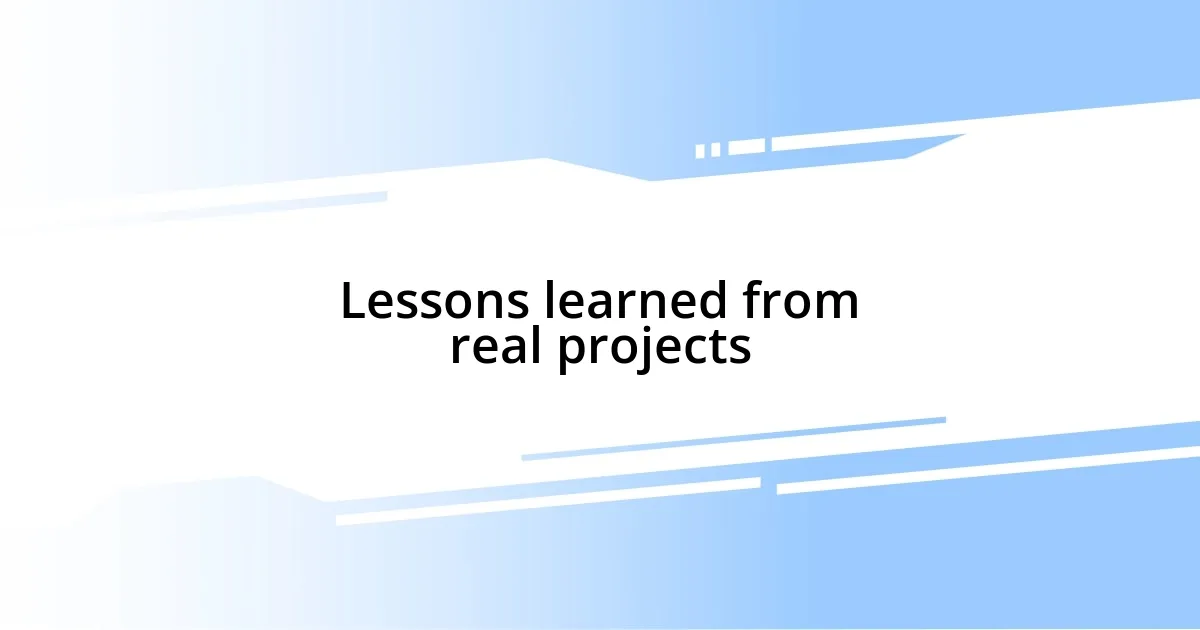
Lessons learned from real projects
Reflecting on my time with real projects, one lesson that stands out is the importance of effective communication within the team. I recall a project where miscommunication led to a complete overhaul of a feature just days before the deadline. It felt like I was running against time, and I realized that having regular check-ins and clear channels of communication can save everyone a lot of headaches. Have you ever found yourself in a situation like that? It’s a stark reminder that collaboration isn’t just a buzzword; it’s the backbone of project success.
Another takeaway for me has been the value of flexibility in project planning. Early on, I was overly attached to my roadmaps and timelines, but projects often evolve in unexpected ways. In one instance, I stubbornly pushed to stick to an initial design, only to realize that user feedback demanded a pivot. That experience taught me to embrace iterative development. It’s so empowering to adapt and improve based on real-world input. How often do you find yourself needing to adjust your plans?
Lastly, I learned that tackling technical debt can’t be an afterthought. I once let it accumulate unchecked, thinking I’d address it later. Eventually, my project became unwieldy, and fixing it felt like solving a puzzle without knowing where the pieces belonged. The frustration was overwhelming, but it also instilled in me a commitment to maintain clean code from the start. Do you see the value in prioritizing maintenance? It’s a lesson that has reshaped how I approach every new project I take on.




